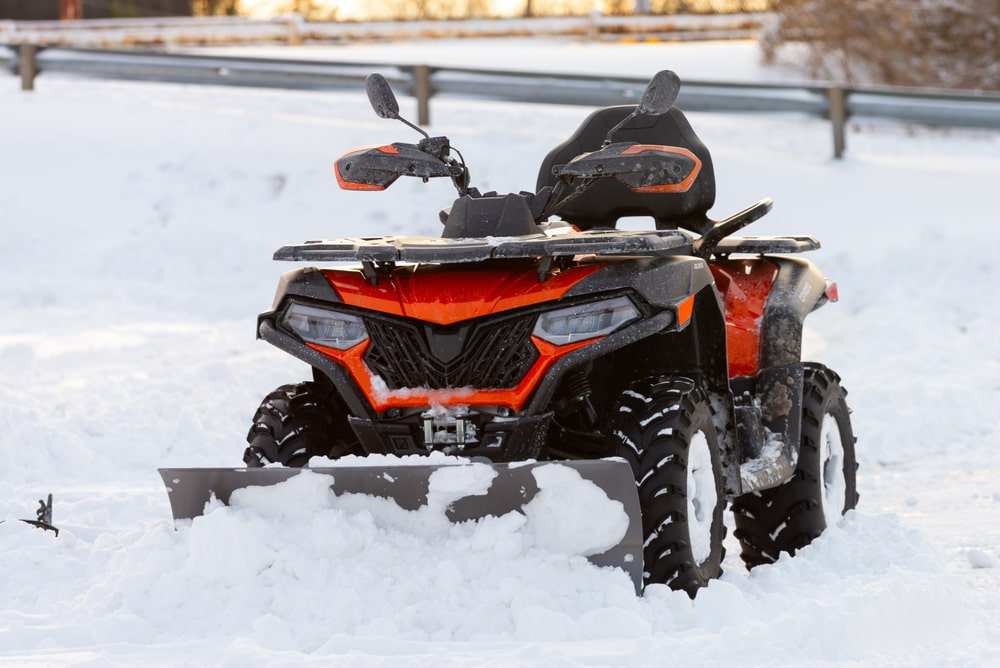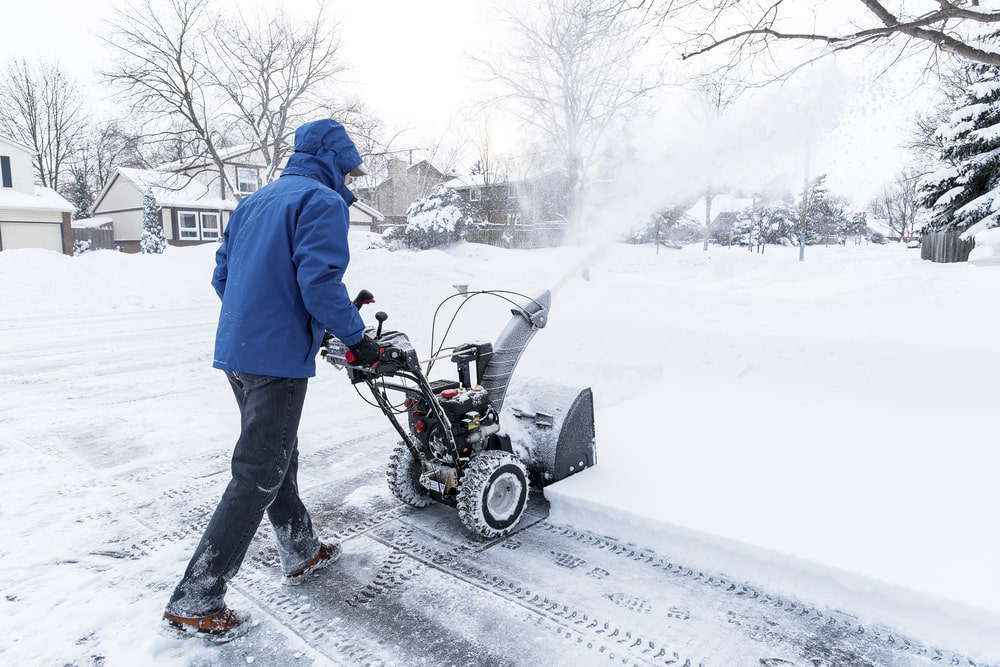Snow Blower vs. Plow: Choosing the Best Tool for Snow Removal

Last Updated October 5, 2023
Freshly fallen snow looks beautiful, as white crystals blanket everything in sight. Unfortunately, that includes your sidewalks and driveway, where snow removal is necessary to provide a clear and safe pathway. There are a number of snow removal options to choose from, and which one works best for you and your property is a personal decision that only you can make. Before you head out to purchase a snow blower or plow, do some research to make the most of your investment and for the best results.
Considering we’ve cleared our share of sidewalks and driveways during Canadian winters of the past, we thought we’d weigh in on the topic. So let’s dig in, or should we say dig out, which is better: a snow blower or a snow plow?
Table of Contents:
Understanding the Differences Between Snow Blowers and Plows
If you choose to do snow removal yourself, there are two powerful options: snow blowers and plows. Snow blowers and snow plows are both effective snow removal tools, but there are differences between the two. Which is better? The debate goes on, but the real winner in the snow blower vs. plow competition is you!
Snow Plow vs. Snow Blower
Shoveling snow is back-breaking work and only practical in areas of the country that experience snow once or twice a season. For the rest of the country, a snow blower or plow is the perfect solution for safe snow removal, but which one is right for you?
Snow Plow

A snow plow is an accessory that is affixed to the front of a commercial vehicle, ATV, or UTV and used to effectively scoop and displace snow with a curved, angled blade. If you're wondering if a snow plow is the best option for your needs, consider the following:
Snow Plow Pros
- Speed - With the right vehicle behind it, a snow plow can quickly and effortlessly clear large volumes of snow.
- Capacity - A snow plow is a great solution for larger applications such as long driveways, roads, and parking lots.
- Reliability - There is little that can go wrong with the snow plow itself, and if it is attached to a dependable vehicle, it can provide years of reliable service.
Snow Plow Cons
- Cost - Purchasing a heavy-duty snow plow is a big investment, in addition to the cost of vehicle purchase and operation.
- Visibility - Visibility is reduced at the ground level, with an increased chance of an accident or damage to the vehicle or property.
- Space Restrictions - Do you have a dedicated space to store your snow plow during the winter and/or off-season? In addition to storing the plow itself, the nature of the equipment means there are limitations on where it can place the resulting piles of snow.
- Damage - Increased speed, limited visibility, and a powerful motor can result in damage to your vehicle, property, structural components, and surfaces such as brick or loose stone.
- Limitations - The size and power of a snow plow render it ineffective for clearing areas such as a deck or patio, sidewalks or paths, and short to medium-sized driveways.
Snow Blower

A snow blower is an independent unit that is guided by the user from behind. While there are many different makes, models, and features to choose from, the basic mechanics are the same: snow is removed from a designated surface using a rotating spiral blade that picks it up and propels it out the side.
Snow Blower Pros
- Size - Their compact size makes a snowblower much easier to store and maneuver in tight spaces.
- Visibility - Ground-level access means you can see everything in front of and around you.
- Safety - Built-in safety features and hands-on control are safer for the user and their property.
- Efficiency - Make quick work of smaller driveways and walkways.
Snow Blower Cons
- Exposure - During the process of clearing your property, you will be exposed to the elements, including freezing temperatures, falling snow, or cold wind.
- Time - It can take much longer to clear a large area using a snow blower in comparison to a snow plow.
- Capacity - Smaller, single-stage snow blowers work extremely well with light and fluffy snow. Snow that is heavy and has a lot of moisture in it makes using this machine more difficult due to its design and lack of power. Two-stage or three-stage snow blowers are designed for heavier snow.
- Depth – Single-stage snow blowers are best suited for snowfall up to 6 inches or 15.24 centimeters. Deeper snowfall requires investing in a more expensive machine like a two-stage or three-stage snow blower.
Factors to Consider When Choosing a Snow Removal Tool
Snow removal tools like blowers and plows can make the job of removing snow less strenuous than if you're a shovel to remove snow. However, there are some hazards to consider. For example, snow blowers and plows are associated with injuries such as amputations, eye injuries, and even shock/electrocution from damaged cords or contact with power lines.
Besides safety concerns, you'll also want to consider the following factors when choosing a snow removal tool that is right for your needs:
- Size of driveway, path, or area: Are you looking for the best snow removal tool for a long driveway, or do you need something better suited for tight spaces?
- Driveway surface: Is your driveway covered in gravel, or is it paved?
- Snow quantity and type: What is the average amount of snow, and what type? Snow plows are helpful in areas that receive snow once or twice a season. A snow blower works better in places that receive heavy snow flow.
- Maneuverability: Choose a snow removal tool that is easy to maneuver.
- Noise level: Snow blowers that run on electricity tend to be quieter than their gas-powered counterparts.
How to Properly Use a Snow Blower or Plow
Knowing how to use a snow blower or plow properly can help reduce the strain of removing snow and the risk of injury. The following are a few tips to consider:
- Have a plan.
- Follow the operation procedures so you can better understand the controls.
- Wear safety glasses.
- Make multiple passes.
- Take smaller bits in deep snow.
- Perform regular seasonal maintenance.
Maintenance and Upkeep of Snow Blowers and Plows
You can help extend the life and improve the efficiency of your snow blower or plow with proper maintenance. Here are some maintenance tips to follow:
Snow Blower Maintenance:
- Frequently check shear bolts/pins and other fasteners to ensure tightness.
- Adjust or replace skid shoes/plates, and shave plates/scraper bars.
- Maintain proper tire pressure.
- Lubricate any moving parts.
- Check the oil level before each use (for gas snow blowers) and change the air filter as needed.
- Change the spark plugs once a season or every 100 hours (gas blowers).
Snow Plow Maintenance:
- Inspect thoroughly to ensure everything is in working order.
- Check the plow’s cutting edge.
- Check plow shoes.
- Inspect and tighten all fasteners on the plow and vehicle mount.
- Check the welds.
- Check grease contact points.
- Ensure electrical connections are tight and clean.
- Use dielectric grease to protect electrical connections.
Making the Right Choice for Your Snow Removal Needs
Even with the right equipment, snow removal is strenuous, risky work. If you don't have the right equipment, time, or energy to do it properly and safely, contact The Grounds Guys nearest you for snow removal services in your area. We provide free estimates!
Did you know? The Grounds Guys is a member of the Neighborly family of home service brands. Our customers always come first and we back all our work with the Neighborly Done Right Promise™, which guarantees your satisfaction. We make sure every service is completed to the highest standards.
 Click to call
Click to call


